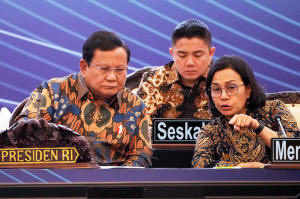As China and the US spar, countries brainstorm over how to cope with the
trade war
[April 09, 2025] By
ELAINE KURTENBACH
BANGKOK (AP) — U.S. President Donald Trump and China sparred over tariff
hikes and other retaliatory moves on Tuesday, as governments elsewhere
were brainstorming strategies to cope with the trade war between the
global economic giants.
China said it will “fight to the end” and take countermeasures against
the United States to safeguard its own interests after President Donald
Trump threatened an additional 50% tariff on Chinese imports in
retaliation for Beijing's backlash against the 34% tariffs he ordered on
his April 2 “Liberation Day.”
“The U.S. threat to escalate tariffs on China is a mistake on top of a
mistake and once again exposes the blackmailing nature of the US. China
will never accept this," the Commerce Ministry said in a statement read
on state-run broadcaster CCTV.
When asked about the possibility of talks between Washington and
Beijing, Chinese Foreign Ministry spokesperson Lin Jian said “I think
what the US has done doesn’t reflect a willingness for sincere dialogue.
If the US really wants to engage in dialogue, it should adopt an
attitude of equality, mutual respect and mutual benefit.”
Meanwhile, Chinese state-run companies were told to help support the
country's financial markets after they were hit by massive saves of
selling on Monday.
While world markets calmed somewhat after frenzied selling over two
trading sessions that wiped out trillions of dollars worth of wealth,
leaders in Asia shifted into damage control mode.

Help for Japan's automakers and steel mills
Japanese Prime Minister Shigeru Ishiba spoke with Trump late Monday and
then convened a task force Tuesday to mitigate damage from the 24% U.S.
tariffs imposed on Washington’s biggest ally in Asia.
Economic Revitalization Minister Ryosei Akazawa was appointed lead trade
negotiator and senior officials were dispatched to Washington to follow
up on the Ishiba's talk with Trump.
Ishiba told his ministers to do their utmost to get Trump to reconsider
and also to mitigate the impact from the U.S. “reciprocal” tariffs,
which he said would be a blow to all industries, Chief Cabinet Secretary
Yoshimasa Hayashi told reporters.
India wants a deal
India’s Foreign Minister S. Jaishankar spoke with his U.S. counterpart
Marco Rubio late Monday, pitching for an early conclusion of
negotiations for a bilateral trade agreement.
India, which faces a 26% tariff on its exports to the U.S., is hoping
for concessions as part of the trade deal. A first tranche of the
agreement is expected by this fall. Washington wants India to allow more
open market access for U.S. dairy and other farm products, but New Delhi
has balked at that since farming employs the bulk of India's workforce.
[to top of second column] |

Indonesian President Prabowo Subianto, left, talks with Finance
Minister Sri Mulyani Indrawati during an event called Economic
Gathering with the President of the Republic of Indonesia, in
Jakarta, Indonesia, Tuesday, April 8, 2025. (AP Photo/Dita Alangkara)
 India’s Trade Minister Piyush Goyal
planned to meet with exporters Wednesday to gauge the potential
impact and cushion the economy from the tariffs.
A State Department statement said Rubio and Jaishankar discussed
ways to deepen collaboration, the tariffs and “how to make progress
toward a fair and balanced trade relationship.”
Malaysia promises ‘soft diplomacy’ response
Malaysian Prime Minister Anwar Ibrahim said his government and other
Southeast Asian countries would send officials to Washington to
discuss the tariffs and it was working to build a consensus on a
unified response among the 10 members of the Association of
Southeast Asian Nations as they convened an investment conference in
Kuala Lumpur.
“We do not believe in megaphone diplomacy,” Anwar said, “As part of
our soft diplomacy of quiet engagement, we will be dispatching
together with our colleagues in ASEAN our officials in Washington to
begin the process of dialogue.”
Still, he chided the U.S., saying Malaysia’s trade with the U.S. had
long been a model of mutual gain, with its exports supporting
Malaysia’s growth as well as high-quality jobs for Americans. The
24% tariff recently imposed on Malaysian imports was “harming all”
and might have negative impact on both economies, he said.
Anwar said Malaysia would stick to a policy of diversifying its
trade at a time of uncertainty over globalization and changing
supply chains.
Hong Kong vows more, not less, open trade
In Hong Kong, which has a free-trade policy and operates as a free
port with few trade barriers, Chief Executive John Lee echoed
Beijing in blasting Trump's tariffs as “bullying” and “ruthless
behavior” he said had damaged trade and raised global uncertainty.
Lee said the former British colony, which came under Beijing's
control in 1997 but has limited autonomy, would draw closer to the
Chinese mainland, sign more free trade agreements and strive to
attract more foreign investment to help blunt the impact of the
higher U.S. duties.

___
Niniek Karmini and Edna Tarigan in Jakarta, Rajesh Roy in New Delhi,
Mari Yamaguchi in Tokyo and Kanis Leung in Hong Kong contributed.
All contents © copyright 2025 Associated Press. All rights reserved |